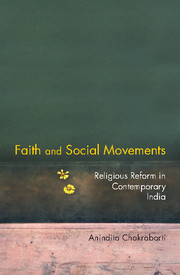Book contents
- Frontmatter
- Contents
- List of Figures
- Preface
- Acknowledgments
- Introduction: Dissent, Religion and Civil Society
- Part I Svadhyaya Ethics and the Spirit of Voluntarism
- Part II The Tablighi Jamaat's Call for Self-reform
- 5 Pedagogy of Tablighi Reform: The Mission and the Messenger
- 6 ‘Unintended Consequences’ of Piety and Discourses of Islamic Reform
- Conclusion: Religion, Movements and Secularity
- Glossary
- Bibliography
- Index
5 - Pedagogy of Tablighi Reform: The Mission and the Messenger
from Part II - The Tablighi Jamaat's Call for Self-reform
Published online by Cambridge University Press: 28 February 2018
- Frontmatter
- Contents
- List of Figures
- Preface
- Acknowledgments
- Introduction: Dissent, Religion and Civil Society
- Part I Svadhyaya Ethics and the Spirit of Voluntarism
- Part II The Tablighi Jamaat's Call for Self-reform
- 5 Pedagogy of Tablighi Reform: The Mission and the Messenger
- 6 ‘Unintended Consequences’ of Piety and Discourses of Islamic Reform
- Conclusion: Religion, Movements and Secularity
- Glossary
- Bibliography
- Index
Summary
Tabligh is essentially about not more than two things, one material, the other spiritual.
Maulana Ilyas's letter to A. H. A. NadwiA Tablighi Jamaat activist once narrated a conversation between the police and Maulana Umarsaab that is said to have taken place during the Emergency.
P: Who is the head of your organization?
U: Prophet Mohammad and he is dead.
P: Where is the headquarters of your organization?
U: The headquarters are Mecca and Medina.
P: What about the branches then?
U: All the masjids in the world.
P: What is the source of your finances?
U: Whatever amount available in the pockets of Muslims.
P: The Constitution of your organization?
U: The Holy Quran.
P: Who are your members?
U: All the Muslims in the world.
A Tablighi Jamaat activist, Gandhinagar, October 2009At the Nizamuddin mosque in Delhi where the Tablighi Jamaat headquarters is located, one witnesses a continuous flow of people from all walks of life. The peripatetic volunteers claim that they contribute their time, energy and money for the purpose of making oneself a better Muslim in the true sense of the term. In Tariqbhai's words, my co-passenger on a Gujarat-bound train from Delhi, the Tablighi Jamaat teaches that ibādat (worship) has to be performed in one's daily life, not only in the masjid (mosque). Tariqbhai was on his way home from Nizamuddin, and I was on my way to Gujarat to find a suitable locale for my fieldwork on Svadhyaya. During the journey, Tariqbhai spoke to me for hours on the tenets of the Tablighi Jamaat and I was struck by their resonance with Svadhyaya soteriology. Next morning when we bade goodbye, he told me that if I wanted to do ‘rechearsh’ (sic) on Tablighi Jamaat I should go to his village. Though I never got an opportunity to visit him in his village in Saurashtra, I acquainted myself with the Tablighi Jamaat activists in a village close to Harshupur. The discussion in the present chapter and the next is based on my interaction with the village-level activists in 2000–2001 and again in 2003, 2004 and 2009.
- Type
- Chapter
- Information
- Faith and Social MovementsReligious Reform in Contemporary India, pp. 135 - 155Publisher: Cambridge University PressPrint publication year: 2017



